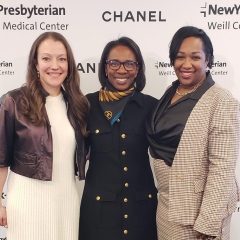Weill Cornell Medicine has received a five-year, $2.3 million grant from the Centers for Disease Control and Prevention to improve equitable access to care, quality of life and survival outcomes for young people with all stages of breast cancer.
The grant will enable Weill Cornell Medicine to enhance care coordination for patients and caregivers to optimize support of physical, mental, emotional, social and spiritual needs, while offering culturally relevant resources and targeted interventions. The initiative will include a focus on racially, ethnically and socio-economically diverse young breast cancer survivors across Manhattan, Queens and Brooklyn, including Black, Asian and Jewish women, with the goal of reducing symptom burden, increasing adherence to treatment and follow-up care, and improving survival outcomes.
Targeted educational materials, in-person learning opportunities, coordinated strategies to lessen treatment side effects and dedicated clinics serving specific populations will help ensure patients “continue to live with the best possible quality of life, take care of their loved ones, work and do whatever they desire with as little interruption as possible,” said oncologist and principal investigator Dr. Vered Stearns, who in 2023 was recruited to Weill Cornell Medicine as a professor of medicine from Johns Hopkins Medicine.






